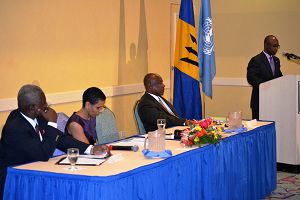Barbados Parliamentarians Launch Community Dialogues on HIV
Date:

The Parliamentarians' Community Dialogues on HIV Prevention and Ending Stigma and Discrimination was launched recently at the Accra Beach Hotel and Resort.
The project is supported by the United Nations System in Barbados with funding being provided through the UNAIDS Project Accelerated Funds facility. The Barbados National HIV/AIDS Commission (NHAC) and the United Nations Entity for Gender Equality and the Empowerment of Women (UN Women) are supporting the Office of the Speaker in the project’s implementation.
UN Women Regional Programme Director Roberta Clarke told the opening ceremony:
"Over time, and despite the extensive information and awareness of the disease, the modes of transmission and effects, Caribbean infection rates have not been reduced significantly and in some countries have grown even though levels of morbidity and mortality as well as mother to child transmission are curtailed dramatically."
Ms. Clarke added that:
"And so we have a clearer understanding that really enhancing resilience to HIV will require profound transformation of the ‘deep politics of culture”. This process requires sustained community engagement and outreach; requires changes to gender socialization as we understand better now that it is stereotypical notions of masculinity and femininity, unequal power relations between women and men that explain in great measure HIV vulnerability".
The launch comes on the heels of the adoption on 10 June 2011 by the United Nations General Assembly of the Political Declaration on HIV/AIDS: Intensifying our Efforts to eliminate HIV/AIDS. This Declaration calls on all UN Member States to redouble their efforts to achieve universal access to comprehensive prevention programmes, treatment, care and support by 2015, as a critical step towards ending the global AIDS epidemic.
Please click here to read the full speech of the UN Women RPD
Great progress has been made in Barbados by the National HIV/AIDS Commission and its governmental and non-governmental partners in fashioning and implementing integrated responses to halting and reversing the spread of HIV and AIDS. With a focus on care and treatment, HIV mortality rates in Barbados have declined significantly as have mother to child transmission rates.
Despite investments in public education, significant numbers of young people continue to engage in risky sexual behaviour however, and stigma and discriminatory attitudes continue to impede access to prevention, care and treatment.
In this context, the Parliament-approved “Barbados National HIV Policy: A Framework for Action 2008” prioritises communications and advocacy for behaviour change as well as the securing of an environment that encourages respect and tolerance towards people living with HIV and persons ‘at risk’.
One objective of the Barbados policy is “to achieve positive and sustained behavioural change, not only among the vulnerable groups, but also across the entire population through evidence-based planning and targeted interventions.”
In recognition that leadership is critical for an impactful HIV/AIDS response, the Inter-Parliamentary Union (IPU - international organisation of Parliaments), UNAIDS and the United Nations Development Programme (UNDP) collaborated on the second edition of Taking Action Against HIV: A Handbook for Parliamentarians. The handbook notes that Parliamentarians are “the “voice” of the people; opinion leaders and decision-makers; lawmakers; overseers of Government activities; and overseers of national budgets and thus have the potential to impact on every aspect that affects HIV mitigation efforts.”
“Parliamentarians must establish a system of governance based on protecting, promoting, and fulfilling the human rights of all people...”
Taking Action Against HIV: A Handbook for Parliamentarians (p.xv)